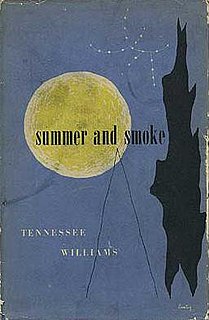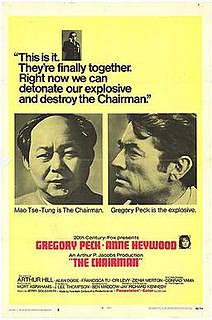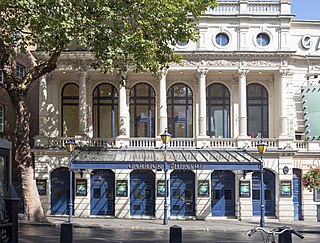
Summer and Smoke is a two-part, thirteen-scene 1948 play by Tennessee Williams, originally titled Chart of Anatomy when Williams began work on it in 1945. The phrase "summer and smoke" probably comes from the Hart Crane poem "Emblems of Conduct" in the 1926 collection White Buildings. After a disappointing Broadway run in 1948, the play was a hit Off-Broadway in 1952. In 1964, Williams revised the play as The Eccentricities of a Nightingale.

Charles Bronson was an American actor.

Walter John "Jack" Buchanan was a Scottish theatre and film actor, singer, dancer, producer and director. He was known for three decades as the embodiment of the debonair man-about-town in the tradition of George Grossmith Jr., and was described by The Times as "the last of the knuts." He is best known in America for his role in the classic Hollywood musical The Band Wagon in 1953.

Rona Anderson was a Scottish stage, film, and television actress.
Eye of the Devil is a 1966 British mystery/horror film with occult and supernatural themes directed by J. Lee Thompson and starring Deborah Kerr, David Niven and Sharon Tate. The film is set in rural France and was filmed at the Château de Hautefort and in England. Eye of the Devil is based on the novel Day of the Arrow by Robin Estridge and was initially titled Thirteen.

The Chairman is a 1969 spy film starring Gregory Peck. It was directed by J. Lee Thompson. The screenplay was by Ben Maddow, based on a novel by Jay Richard Kennedy.
Christopher Guy Landon, known as Christopher Landon was a British novelist and screenwriter best known for the novel and film Ice Cold in Alex.

Between the Devil is a musical comedy with book and lyrics by Howard Dietz and music by Arthur Schwartz.

As Long as They're Happy is a 1955 British musical comedy film directed by J. Lee Thompson and starring Jack Buchanan, Susan Stephen and Diana Dors. It is based on the 1953 play of the same name by Vernon Sylvaine.

The Large Rope is a 1953 British crime film directed by Wolf Rilla and starring Donald Houston, Susan Shaw and Robert Brown.
Auld Lang Syne is a 1917 British silent crime film directed by Sidney Morgan and starring Violet Graham, Henry Baynton and Sydney Fairbrother. The film is notable for marking the screen debut of Jack Buchanan who went on to be a leading star. It was produced in a film studio at Ebury Street in Westminster.
The Walls Came Tumbling Down is a 1946 American crime film directed by Lothar Mendes and starring Lee Bowman, Marguerite Chapman and Edgar Buchanan. It is considered a film noir.
After Many Years is a 1930 British crime film directed by Lawrence Huntington and starring Henry Thompson, Nancy Kenyon and the Savoy Havana Band. It was made as a quota quickie for released by the Hollywood studio MGM. In the film, a murdered policeman's son tracks down the murderer in Peru.
Romance in Rhythm is a 1934 British mystery film directed by Lawrence Huntington and starring Phyllis Clare and David Hutcheson, David Burns. It was made at Cricklewood Studios. The screenplay concerns a songwriter who is accused of murdering a nightclub manager.

The Young and the Guilty is a 1958 British drama film directed by Peter Cotes and starring Phyllis Calvert, Andrew Ray and Edward Chapman. Parents misconstrue the innocent nature of a teenage romance. The film's art direction was by Terence Verity.
Her Heritage is a 1919 British silent crime film directed by Bannister Merwin and starring Jack Buchanan, Phyllis Monkman and Edward O'Neill.
Monica Kimick (1906–1982) was a British film editor.

Campbell Cotts (1902–1964) was a South African-born actor of British stage, film and television. A former barrister and a published poet, Cotts studied at Cambridge and fought in WW II, attaining the rank of 1st Lieutenant in the Black Watch. His acting roles included a Broadway appearance opposite Katharine Hepburn in a revival of Shaw's The Millionairess at the Shubert Theatre in 1952.

The Fleet's Lit Up is a musical comedy first staged in London in 1938 with music and lyrics by Vivian Ellis and a book by Guy Bolton, Fred Thompson and Bert Lee. It ran for 191 performances at the London Hippodrome from August 1938 to February 1939. The original cast included Stanley Lupino, Frances Day and Adele Dixon. It was produced and directed by George Black. The title refers to the phrase used constantly by BBC commentator Thomas Woodrooffe during a drunken broadcast for the 1937 Spithead Review.












